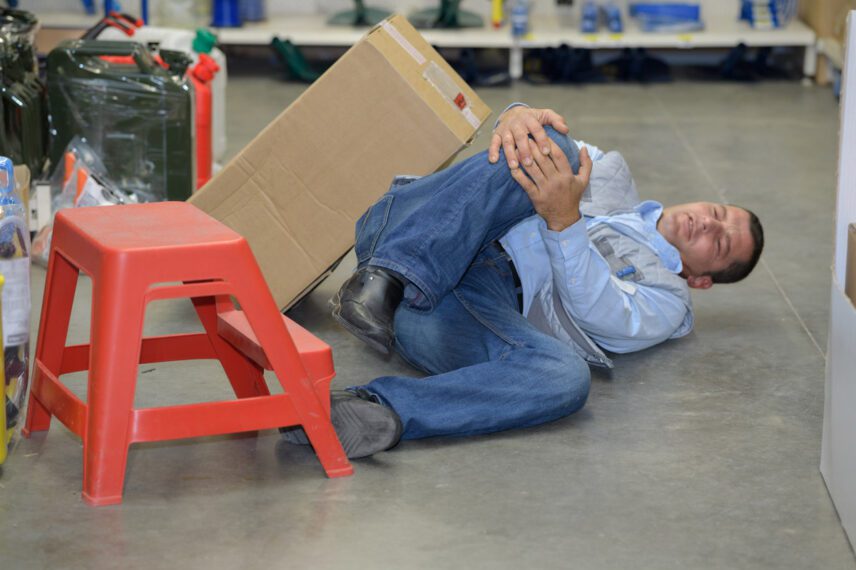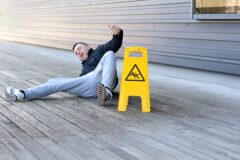A Basic Guide to Slip & Fall Accident Compensation

If you fall and injure yourself on someone else’s property, you may be able to file suit for compensation for your injuries. Premises liability law is a law that holds property owners responsible for any injuries on their property due to negligent or dangerous conditions and allows victims to seek compensation for their damages. Below, we’ve created a brief guide to help you understand the basic rights you have after experiencing a slip-and-fall accident and know what actions you need to take next to recover financially from your losses.
When Is a Slip-and-Fall Claim Liable for Suit?
To take legal action, a slip-and-fall case must show that a property owner failed to provide you with a duty of care which led to your injuries. This means they did not take the steps necessary to maintain their premises or warn visitors of potentially dangerous areas. Property owners are legally responsible for keeping their premises safe and minimizing risk. To prove the owner was willfully negligent, there are a few factors that you need to provide evidence for, including:
- The property owner caused the dangerous area, was aware of it or should have been aware of it had they exercised reasonable caution.
- The owner actively refused to correct the hazardous condition or warn patrons of the area.
- The owner’s negligence directly led to your injury
- The injury caused damages
What Types of Accidents Count as a Slip-and-Fall?
As the name implies, a slip-and-fall occurs when a person slips on a spot on the ground below them and falls, causing injury. Several different kinds of conditions can contribute to a slip-and-fall, including:
- Wet floors
- Uneven ground
- Loose flooring or carpeting
- Unsalted ice
- Potholes
- Debris or obstacles on the ground
- Poor lighting
- Uneven or improperly placed safety rails
However, your own negligence may play a role in a slip-and-fall. For instance, if you actively decided to walk past a “Wet Floor” sign and fell. Depending on the state of your accident and why you acted negligently, you may or may not be eligible to file a suit against the property owner if you are partially responsible for the accident.
Does the Location of Your Fall Affect Your Ability to File a Suit?
The location that you fell at directly affects your ability to file a slip-and-fall claim. Each location may have different rules and regulations following an accident, so it’s critical to know your rights.
Government Property
If you fall on a government-owned property, you are eligible to file a suit if the fall resulted from their negligence. However, different procedures and rules apply because you fell on government property. For instance, there is a much shorter deadline to file a formal notice of injury and a statutory limit on how much compensation you can receive from your claim.
Retail Businesses
Because retail businesses invite customers to come onto their property to perform business with them, they are expected to owe a duty of safety to their customers. This means they must proactively fix and maintain any issues on their property; otherwise, any victim of a slip-and-fall on their premises can file a lawsuit. Always ask to file an official injury report, so documentation of your injury exists.
Landlord Property
Slip-and-falls on a landlord-owned property can be slightly trickier to prove, as you must show evidence that the landlord was aware of any dangerous conditions on the property and that they had a duty to correct the conditions.
How to File a Slip-and-Fall Claim
First and foremost, filing your claim as soon as possible is crucial. Each state has a statute of limitations defining when you must file a claim in relation to when your injury takes place. If you wait too long to file a claim and are no longer within the statute of limitations, you will be unable to pursue legal action, so it’s vital to know your state’s statute of limitations.
Additionally, you must also file a claim in court in the area where the fall took place. Once you file your claim, you will be given an opportunity to settle out of court. Typically, the insurance company will offer you an amount lower than your case is actually worth, so it’s crucially important to never accept the first offer of compensation.
Once you reject the first offer of compensation, you will go through a series of negotiations with the defendant’s insurance company. If you continue to reject their settlement renegotiation offer, then you will proceed to a courtroom trial where either a judge or a jury will determine the final verdict and compensation amount.
We highly suggest talking to an experienced slip-and-fall attorney before ever speaking with insurance, let alone negotiating. A seasoned personal injury lawyer will help you understand your rights, negotiate with insurers, and make sure you get the financial compensation you deserve.
Slip-and-Fall Claim Compensation
Compensation for slip-and-falls is highly circumstantial and depends heavily on the amount of economic and non-economic damages you suffered due to your injury. While there is no set average for how much a slip-and-fall is worth, the vast majority of cases settle for around $10,000 to $50,000, although this can vary greatly. Your compensation depends on several factors, including:
- Economic Damages (such as medical bills and lost wages)
- Non-Economic Damages (such as pain and suffering and emotional distress)
- The severity of your injuries
- If you suffered a disability because of your injuries
- If you accepted partial responsibility for the fall or not
Conclusion
To successfully file a slip-and-fall claim, you must prove that the property owner was negligent in handling dangerous areas of their premises. Various types of premises may have different procedures for filing a claim, so it’s essential to understand how to proceed with your case. One of the best ways to guarantee you maximize your compensation is by hiring a skilled personal injury attorney who can guide you through the legal process. An attorney will help you to collect evidence, negotiate with insurers, and ensure that you give yourself the best chance at receiving the financial compensation you deserve for your accident.






